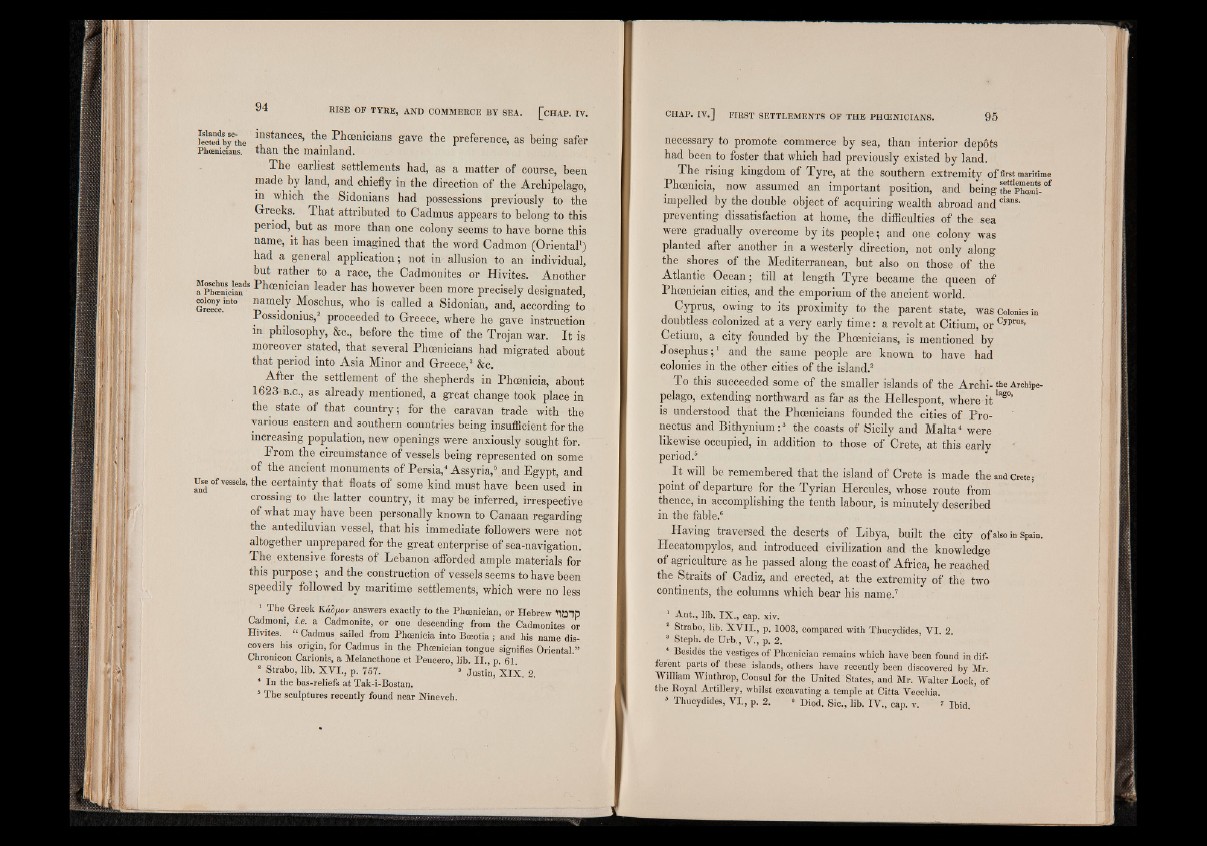
f S S g t lnstances’ the Phoenicians gave the preference, as being safer
Phoenicians, than the mainland.
The earliest settlements had, as a matter of course, been
made by land, and chiefly in the direction of the Archipelago,
in which the Sidonians had possessions previously to the
Greeks. That attributed to Cadmus appears to belong to this
period, but as more than one colony seems to have borne this
name, it has been imagined that the word Cadmon (Oriental1)
had a general application; not in allusion to an individual,
but rather to a race, the Cadmonites or Hivites. Another
^Ph®niiands ^hceiiieian leader has however been more precisely designated,
Greece.™*0 Mosclms> *■' called a Sidonian, and, according to
Possidonius, proceeded to Greece, where he gave instruction
in philosophy, &c., before the time of the Trojan war. It is
moreover stated, that several Phoenicians had migrated about
that period into Asia Minor and Greece,3 &c.
After the settlement of the shepherds in Phoenicia, about
1623 B.C., as already mentioned, a great change took place in
the^ state of that country; for the caravan trade with the
various eastern and southern countries being insufficient for the
increasing population, new openings were anxiously sought for.
From the circumstance of vessels being represented on some
of the ancient monuments of Persia,4 Assyria,5 and Egypt, and
Use of vessels, the certainty that floats of some kind must have been used in
crossing to the latter country, it may be inferred, irrespective
of what may have been personally known to Canaan regarding
the antediluvian vessel, that his immediate followers were not
altogether unprepared for the great enterprise of sea-navigation.
The extensive forests of Lebanon afforded ample materials for
this purpose; and the construction of vessels seems to have been
speedily followed by maritime settlements, which were no less
1 The G-reek KaS/wy answers exactly to the Phoenician, or Hebrew 'IQ lp
Cadmoni, i.e. a Cadmonite, or one descending from the Cadmonites or
Hivites. “ Cadmus sailed from Phoenicia into Boeotia; and his name discovers
his origin, for Cadmus in the Phoenician tongue signifies Oriental.”
Chronicon Carionis, a Melancthone et Peucero, lib. I I ., p. 61.
! Strabo, lib. X V I., p. 757. 3 Justin, X IX . 2.
* In the bas-reliefs at Tak-i-Bostan.
5 The sculptures recently found near Nineveh.
necessary to promote commerce by sea, than interior dépôts
had been to foster that which had previously existed by land.
The rising kingdom of Tyre, at the southern extremity of first maritime
Phoenicia, now assumed an important position, and being thePhoenb °f
impelled by the double object of acquiring wealth abroad and oians'
preventing dissatisfaction at home, the difficulties of the sea
were gradually overcome by its people ; and one colony was
planted after another in a westerly direction, not only along
the shores of the Mediterranean, but also on those of the
Atlantic Ocean ; till at length Tyre became the queen of
Phoenician cities, and the emporium of the ancient world.
Cyprus, owing to its proximity to the parent state, was Colonies in
doubtless colonized at a very early time : a revolt at Citium, or Cyprus’
Cetium, a city founded by the Phoenicians, is mentioned by
Josephus ;1 and the same people are known to have had
colonies in the other cities of the island.2
To this succeeded some of the smaller islands of the Archi- d,e Archipe-
pelago, extending northward as far as the Hellespont, where it lag°’
is understood that the Phoenicians founded the cities of Pro-
nectus and Bithynium:3 the coasts of Sicily and Malta4 were
likewise occupied, in addition to those of Crete, at this early
period.5
It will be remembered that the island of Crete is made the and Crete;
point of departure for the Tyrian Hercules, whose route from
thence, in accomplishing the tenth labour, is minutely described
in the fable.6
Having traversed the deserts of Libya, built the city of also in Spain.
Hecatompylos, and introduced civilization and the knowledge
of agriculture as he passed along the coast of Africa, he reached
the Straits of Cadiz, and erected, at the extremity of the two
continents, the columns which bear his name.7
1 Ant., lib. IX ., cap. xiv.
Strabo, lib. X V II., p. 1003, compared with Thucydides, V I. 2.
s Steph. de Urb., V., p. 2.
* Besidès the vestiges o f Phoenician remains which have been found in d ifferent
parts of these islands, others have recently been discovered by Mr.
William Winthrop, Consul for the United States, and Mr. Walter Lock, of
the Boyal Artillery, whilst excavating a temple at Citta Vecchia.
5 Thucydides, VI., p. 2. » Diod. Sic., lib. IV ., cap. v. ' i Ibid.